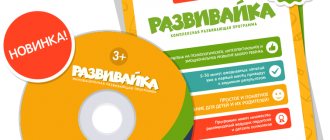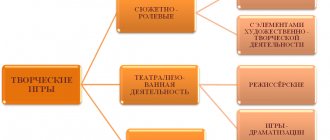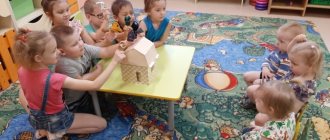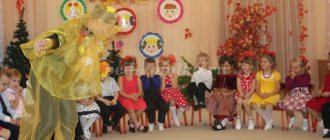MAGAZINE Preschooler.RF
Theater activities in the junior groupTheater is a magical land in which a child rejoices while playing, and in play he learns about the world!
Theatrical activity is an organic synthesis of fiction, music, dance, acting and concentrates the means of expression available in the arsenal of individual arts, contributes to the development of aesthetic perception of the surrounding world, children's fantasy, imagination, memory, cognitive processes, knowledge about the surrounding world and readiness to interact with them.
By participating in the process of theatrical activities, the child learns to work collectively on the concept of a future performance, create artistic images, exchange information, plan various types of artistic and creative activities (selection of musical characteristics for characters, work on a role, etc.), as well as coordinate their functions.
The purpose of the circle.
Development of creative independence, aesthetic taste in conveying an image. Fostering a love for theater and theatrical activities.
Circle tasks.
- Stimulating interest in theatrical and play activities, creating the necessary conditions for its implementation.
- Consolidating ideas about surrounding objects; ability to name pieces of theatrical play equipment. Developing in children interest and respect for toys and theatrical dolls.
- Developing the ability to monitor the development of action in dramatizations and puppet shows.
- Development of children's speech with the help of puppet theater: enriching vocabulary, developing the ability to construct sentences, achieving correct and clear pronunciation of words.
- Formation of the ability to convey basic emotions through facial expressions, posture, gestures, and movements.
- Introducing children to the techniques of puppeteering tabletop dolls.
- Formation of the ability to concentrate attention on a toy, theatrical puppet.
- Encouraging the desire to participate in dance improvisations.
- Supporting the desire to play with musical instruments, improvising on noise musical instruments.
- Development of initiative and independence of children in games with theatrical dolls.
- Developing a desire to perform in front of parents and children's theater staff.
Expected results
- Revealing children's creative abilities (intonation pronunciation, emotional mood, facial expressiveness, imitation skills).
- Development of psychological processes (thinking, speech, memory, attention, imagination, cognitive processes of fantasy).
- Personal qualities (friendships, partnerships; communication skills; love for animals).
September
- "Let's get acquainted".
- “For grandfather, for woman, the Ryaba Hen laid a golden egg.”
- “Autumn is walking along the path.” (based on the fairy tale “Teremok”)
- “Walk in the woods.”
October
- “We play and sing.” (imitation of playing the pipe in the free dance “Masha and the Bear”)
- “The girl forgot to feed the kitten, he couldn’t remember how to ask for food.”
- “I was in the little garden...”
- “Game quiz based on the poems of A. Barto.”
November
- “Time will pass quickly, and the Chicken will grow up.”
- “We danced in a circle.”
- “Zayushkina’s hut.” (cone toy theater)
- “Mirror, mirror - say...”
December
- “The kittens lost their gloves along the way.”
- “The kids stood in a circle and started spinning like a snowball.”
- “Bag with a surprise.” (theater on cardboard)
- “Come visit us.”
January
- “The Tale of a Stupid Mouse.”
- “The hare let the fox into the house, and now he’s alone on the street.”
- “Oh, and a sly fox! It’s hard to kick her out, yes!”
- “Animals visiting the Snow Maiden.”
February
- “We can’t live without friends for anything in the world.”
- “Visiting the hedgehog and the fox.”
- “We are actors.”
- “The fingers came to visit.”
March
- "Spring came!".
- “Tar Goby.” (soft toy theater)
- "Imagine…".
- “The Sparrow and the Cat.”
April
- "In crowded but not mad".
- “Say my mirror, my light...”
- “There are two girlfriends in the swamp, two green frogs.”
- “Just give me time, we’ll build a tower!”
May
- “Guests have come to us!”
- “Palms - palms.”
- “Baby bees, fly!”
- "Two cheerful geese".
September
Topic: “Let's get to know each other.”
Goal: to develop in children a keen interest in theatrical play, a desire to participate in the general action and use the entire surrounding space; Encourage children to actively communicate, develop speech and the ability to build dialogue.
Literature: M. D. Makhaneva “Theater classes in kindergarten” Moscow, Creative Center “Sphere” 2003
Topic: “For grandfather, for woman, the Ryaba Hen laid a golden egg.”
Goal: to stimulate children’s emotional perception of theatrical play and active participation in it; develop motor activity of children.
Literature: T.N. Karamanenko “Puppet theater for preschoolers” Moscow, “Enlightenment” 1982
Topic: “Autumn walks along the paths.” (based on the fairy tale “Teremok”)
Goal: to stimulate children’s emotional perception of fairy tales; replenish the dictionary with vocabulary that reflects a person’s emotional state; learn to find expressive means in facial expressions, gestures, intonations.
Literature: T.I.Petrova, E.Ya.Sergeeva, E.S.Petrova “Theatrical games in kindergarten” Moscow “School press” 2000.
Topic: “Walk in the woods.”
Goal: to teach children to pronounce phrases emotionally; cultivate a caring attitude towards nature, see the beauty of the autumn forest; develop imagination, creativity, associative thinking.
Literature: M. D. Makhanev “Theater classes in kindergarten” Moscow, Creative Center “Sphere” 2003
October.
Topic: “We play and sing.” (imitation of playing the pipe in the free dance “Masha and the Bear”)
Goal: to arouse interest and desire to play with musical toys; encourage children to improvise simple dance movements.
Literature: N. F. Sorokina, L. G. Milavanovich Program “Theater - creativity - children” Moscow 1995
Topic: “The girl forgot to feed the kitten, he couldn’t remember how to ask for food.”
Purpose: to teach to identify oneself with a theatrical character; develop mindfulness; learn to combine movements and speech; consolidate knowledge about the environment.
Literature: T.I.Petrova, E.Ya.Sergeeva, E.S.Petrova “Theatrical games in kindergarten” Moscow “School press” 2000.
Topic: “I was in the little garden...”.
Goal: to teach children to move freely, using all the surrounding space; to cultivate an emotional and figurative perception of the content of short poems; help find means of expressing the image in movements, facial expressions, gestures.
Literature: N. F. Sorokina, L. G. Milavanovich Program “Theater - creativity - children” Moscow 1995
Topic: “Game quiz based on the poems of A. Barto.”
Goal: develop imitation skills; develop imagination, emotional memory; cultivate friendly relationships in the game; continue to work on the intonation expressiveness of children’s speech and their ability to imitate the movements of characters in theatrical action.
Literature: M. D. Makhaneva “Theater classes in kindergarten” Moscow, Creative Center “Sphere” 2003
November
Topic: “Time will pass quickly, and the Chicken will grow up.”
Goal: continue to teach listening to fairy tales, develop associative thinking; develop performing skills through imitation of animals’ habits, their movements and voice; cultivate a love for animals and a desire to admire them.
Literature: M. D. Makhaneva “Theater classes in kindergarten” Moscow, Creative Center “Sphere” 2003
Topic: “We danced in a circle.”
Goal: to foster friendly relationships between children; develop imitative skills and imagination; to form in children the necessary reserve of emotions and impressions.
Literature: T.I.Petrova, E.Ya.Sergeeva, E.S.Petrova “Theatrical games in kindergarten” Moscow “School press” 2000.
Topic: “Zayushkina’s hut” (cone toy theater).
Goal: to support the desire of children to collectively tell familiar fairy tales; ensure the further development of diverse ideas about types of theater.
Literature: T.I.Petrova, E.Ya.Sergeeva, E.S.Petrova “Theatrical games in kindergarten” Moscow “School press” 2000.
Topic: “Mirror, mirror - tell me...”
Goal: to cultivate the ability to control one’s attention, to develop children’s imagination and imagination.
Literature: N. F. Sorokina, L. G. Milavanovich Program “Theater - creativity - children” Moscow 1995
December
Topic: “The kittens lost their gloves on the way.”
Goal: develop the ability to monitor the development of action; continue to teach how to convey the emotional state of characters.
Literature: T.I.Petrova, E.Ya.Sergeeva, E.S.Petrova “Theatrical games in kindergarten” Moscow “School press” 2000.
Topic: “The children stood in a circle and began to spin like a snowball.”
Goal: continue to teach children to improvise to music; develop imagination, associative thinking; to form an aesthetic perception of nature; develop memory of physical sensations.
Literature: M. D. Makhaneva “Theater classes in kindergarten” Moscow, Creative Center “Sphere” 2003
Topic: “Bag with a surprise.” (theater on cardboard)
Goal: to stimulate interest in theatrical play activities; provide a more vivid perception of a literary work; develop spatial and figurative perception.
Literature: N. F. Sorokina, L. G. Milavanovich Program “Theater - creativity - children” Moscow 1995
Topic: “Come visit us.”
Goal: to develop imagination and the ability to navigate in space; to form voluntary attention, to intensify interest in theatrical art; develop imitation skills; learn to express your emotions.
Literature: T.I.Petrova, E.Ya.Sergeeva, E.S.Petrova “Theatrical games in kindergarten” Moscow “School press” 2000.
January
Topic: “The Tale of a Stupid Mouse.”
Goal: to encourage children to actively participate in theatrical play; teach clearly, pronounce words, combining movements and speech; teach emotionally, perceive a fairy tale, pay attention to figurative words, memorize and intonationally expressively reproduce words and phrases from the text.
Literature: M. D. Makhaneva “Theater classes in kindergarten” Moscow, Creative Center “Sphere” 2003
Topic: “The hare let the fox into the house, and now he’s alone on the street.”
Goal: to introduce children to the fairy tale “The Fox, the Hare and the Rooster”; to form in children a sufficiently necessary supply of emotions and impressions; cultivate friendly, partnership-based mutual understanding.
Literature: M. D. Makhaneva “Theater classes in kindergarten” Moscow, Creative Center “Sphere” 2003
Topic: “Oh, and the sly fox! It’s hard to kick her out, yes!”
Goal: teach children to tell a fairy tale with the help of a teacher; develop communication skills; learn to combine speech with plastic movements; encourage participation in theatrical play.
Literature: M. D. Makhaneva “Theater classes in kindergarten” Moscow, Creative Center “Sphere” 2003
Topic: “Animals visiting the Snow Maiden.”
Goal: to create a desire to participate in dramatization games; lead children to create the image of a hero, using facial expressions, gestures, and movements.
Literature: T.I.Petrova, E.Ya.Sergeeva, E.S.Petrova “Theatrical games in kindergarten” Moscow “School press” 2000.
February
Topic: “We can’t live without friends for anything in the world.”
Goal: teach children to solve riddles; develop performing skills through imitation of animal habits; cultivate a love for animals.
Literature: M. D. Makhaneva “Theater classes in kindergarten” Moscow, Creative Center “Sphere” 2003
Topic: “Visiting the hedgehog and the fox.”
Goal: to teach children to pronounce pure words with intonation and expressiveness, changing the strength of their voice; to form a sufficiently necessary supply of emotions and impressions; develop imagination and creativity; cultivate friendly, partnership-based mutual understanding.
Literature: T.I.Petrova, E.Ya.Sergeeva, E.S.Petrova “Theatrical games in kindergarten” Moscow “School press” 2000.
Topic: “We are actors.”
Goal: to form in children characteristic gestures of repulsion, attraction, opening, closing; foster partnerships between children.
Literature: N. F. Sorokina, L. G. Milavanovich Program “Theater - creativity - children” Moscow 1995
Topic: “The little fingers have come to visit.”
Goal: to develop fine motor skills of the hands in combination with speech; develop a sustainable interest in various theatrical activities; introduce the theater of hands; foster partnerships between children; teach children to expressively reproduce a given phrase intonationally.
Literature: T.I.Petrova, E.Ya.Sergeeva, E.S.Petrova “Theatrical games in kindergarten” Moscow “School press” 2000.
March
Topic: “Spring has come!”
Goal: to teach children to pronounce a given phrase with a certain intonation in combination with gestures; develop communication skills, learn to combine melodious speech with plastic movements.
Literature: M. D. Makhaneva “Theater classes in kindergarten” Moscow, Creative Center “Sphere” 2003
Topic: “Tar bull.”
Goal: to develop the ability to evaluate the actions of characters in the theater; continue to shape the emotional expressiveness of children’s speech.
Literature: T.I.Petrova, E.Ya.Sergeeva, E.S.Petrova “Theatrical games in kindergarten” Moscow “School press” 2000.
Topic: “Imagine...”
Goal: to evoke a joyful emotional mood in children; develop basic skills of facial expressions and gestures; teach children to pronounce phrases intonationally; develop imagination.
Literature: N. F. Sorokina, L. G. Milavanovich Program “Theater - creativity - children” Moscow 1995
Topic: “The Sparrow and the Cat.”
Purpose: to teach children to listen to a fairy tale; tell it together with the teacher; form the necessary reserve of emotions; develop imagination.
Literature: M. D. Makhaneva “Theater classes in kindergarten” Moscow, Creative Center “Sphere” 2003
April
Topic: “In cramped conditions, but not in offence.”
Goal: teach children to solve riddles; develop communication skills; learn to combine speech with movement; develop imagination.
Literature: M. D. Makhaneva “Theater classes in kindergarten” Moscow, Creative Center “Sphere” 2003
Topic: “Say my light, mirror.”
Goal: to develop children’s ability to understand the emotional state of another person and be able to adequately express their own
Literature: N. F. Sorokina, L. G. Milavanovich Program “Theater - creativity - children” Moscow 1995
Topic: “There are two girlfriends in the swamp, two green frogs.”
Goal: to develop the articulatory apparatus and continue to work on intonation expressiveness; teach children to use all space in play; develop communication skills; form the necessary reserve of emotions.
Literature: T.I.Petrova, E.Ya.Sergeeva, E.S.Petrova “Theatrical games in kindergarten” Moscow “School press” 2000.
Topic: “Just give me time, we’ll build a tower!”
Goal: will continue to teach children to solve riddles; develop basic skills of facial expressions and gestures; learn to combine movements and speech; develop imagination.
Literature: M. D. Makhaneva “Theater classes in kindergarten” Moscow, Creative Center “Sphere” 2003
May
Topic: “Guests have come to us!”
Goal: to evoke a joyful emotional mood in children; develop basic skills of facial expressions and gestures; teaches children to pronounce phrases with intonation and expressiveness; learn to combine movements and speech; develop imagination.
Literature: T.I.Petrova, E.Ya.Sergeeva, E.S.Petrova “Theatrical games in kindergarten” Moscow “School press” 2000.
Topic: “Palms, palms”
Goal: to learn to reproduce the text of a familiar fairy tale in a theatrical game; develop memory; teach how to select the appropriate intonation to characterize a fairy-tale hero: cultivate friendly relationships and partnership qualities; develop the articulatory apparatus; to form a keen interest in Russian folklore.
Literature: M. D. Makhaneva “Theater classes in kindergarten” Moscow, Creative Center “Sphere” 2003
Topic: “Baby bees, fly!”
Goal: to develop the articulatory apparatus through pronouncing pure language; develop children's creative abilities; encourage active participation in theatrical action; learn to pronounce phrases from a poetic text with intention and expressiveness.
Literature: T.I.Petrova, E.Ya.Sergeeva, E.S.Petrova “Theatrical games in kindergarten” Moscow “School press” 2000.
Topic: “Two funny geese”
Goal: to develop memory of physical sensations; learn to pronounce phrases intentionally and expressively; develop a caring attitude towards the environment; develop pantomic skills.
Literature: T.I.Petrova, E.Ya.Sergeeva, E.S.Petrova. “Theatrical games in kindergarten” Moscow “School press” 2000
Literature
- T.I.Petrova, E.Ya.Sergeeva, E.S.Petrova “Theatrical games in kindergarten” Moscow “School press” 2000
- M.D. Makhaneva “Theatrical classes in kindergarten” Moscow, Creative Center “Sfera”, 2003
- T.N. Karamanenko, Yu.G. Karamanenko “Puppet theater for preschoolers” Moscow “Enlightenment”, 1982
- I.V. Shtanko “Education through art in kindergarten” Moscow, Creative Center “Sphere”, 2007
- N.F. Sorokina, L.G. Milavanovich “Program Theater - creativity - children” Moscow, 1995
| Next > |
Theater in the second junior group
Theatrical activities in kindergarten
Author: Filimonova Svetlana Grigorievna, teacher of the State Budgetary Educational Institution Secondary School No. 319, Moscow, preschool department. Description of the material : I offer material on conducting theater week in the 2nd junior group. This material will be useful to kindergarten teachers. I work in the 2nd junior group. Since the leading type of activity for children is play, an important role belongs to the puppet theater. It entertains and educates children, develops their imagination, teaches them to empathize with what is happening, creates an appropriate emotional mood, liberates the child, and increases his self-confidence. Children really love theatrical games, in which they can transform into their favorite characters, dramatize familiar fairy tales and admire theatrical performances performed by adults and older children. Therefore, I decided to take an active part in the theater week, which took place in our garden from March 24 to March 28 In 2014, theater week took place in our garden. Throughout the week, work was carried out to familiarize children with theatrical activities. At the first lesson, I told the children what theater is, how to behave in the theater. And for parents, I developed a reminder for the first trip to the theater with their children. Then, together with the teachers of another group, we staged the fairy tale “Kolobok” and showed it to the children.
During appliqué classes with children, we made a cut-out appliqué based on the fairy tale: “Turnip.” At home, the children and their parents made little books based on Russian folk tales.
And throughout the week I made different types of theaters (finger theater from papier-mâché, theater from CDs, shadow theater, theater on clothespins, rag dolls, theater from wooden shovels), and the children watched and helped as much as possible. I also made a card index of theatrical games and physical education lessons. In our corner there are several types of theater made with your own hands: All this is very easy to do, beautiful and the children are delighted. They really like to play. And at the end of the week we had a theater corner competition. Our theater took 1st place.
We recommend watching:
Theatrical activity in kindergarten DIY hat. Master class with step-by-step photos Scenario of a theatrical performance for children with disabilities (CP) Theatrical entertainment in the middle group. Scenario
Similar articles:
Dramatization of Chukovsky's fairy tale The Fly Tsokotukha for children 5-7 years old
Dramatization of a fairy tale in the senior group “About the Little Mouse”
Theater performance in the senior group. Fox-sister and gray wolf
Theater quiz for the senior group
Game performance in kindergarten. Middle - senior group



